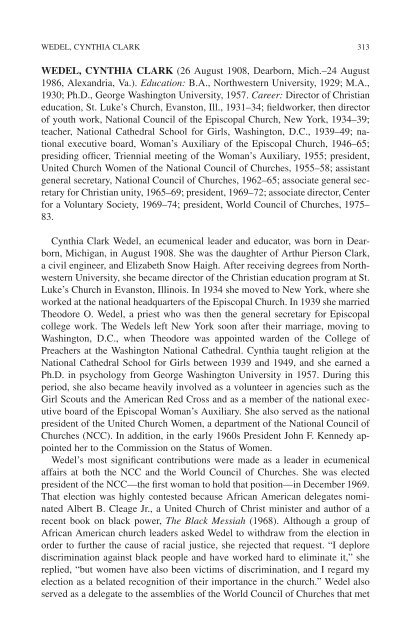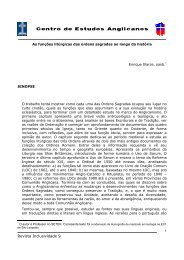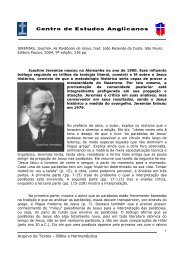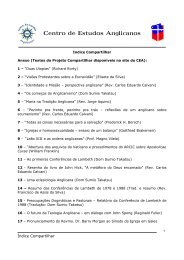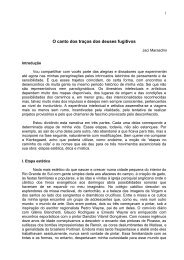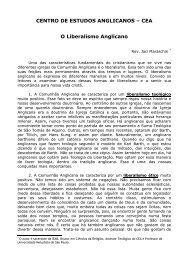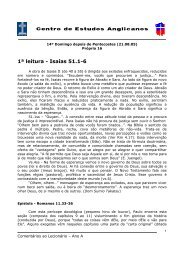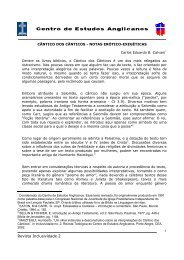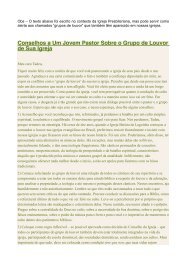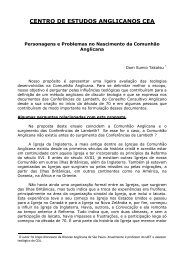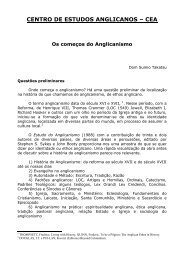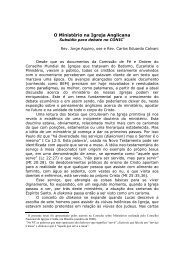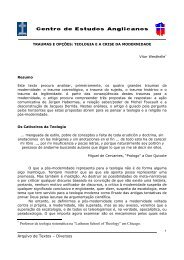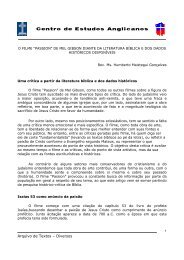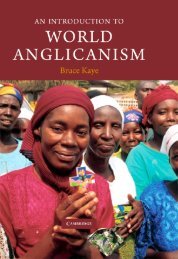- Page 3 and 4:
THE EPISCOPALIANS
- Page 5 and 6:
THE EPISCOPALIANSDAVID HEINandGARDI
- Page 7:
CONTENTSPart OnePart TwoSeries Fore
- Page 10 and 11:
viiiSERIES FOREWORDEach of the hist
- Page 12 and 13:
xPREFACElishment, a politically, th
- Page 14 and 15:
xiiPREFACEIn conclusion, the author
- Page 16 and 17:
xivABBREVIATIONS FOR STANDARD SOURC
- Page 19:
Part OneTHE EPISCOPALIANS:A HISTORY
- Page 22 and 23:
4THE EPISCOPALIANSin the West, Saxo
- Page 24 and 25:
6THE EPISCOPALIANSbella of Spain. W
- Page 26 and 27:
8THE EPISCOPALIANSmarked the reigns
- Page 28 and 29:
10THE EPISCOPALIANSdition, and reas
- Page 30 and 31:
12THE EPISCOPALIANStance to widows,
- Page 32 and 33:
14THE EPISCOPALIANS9. “The Suprem
- Page 34 and 35:
16THE EPISCOPALIANSII, Anglican lea
- Page 36 and 37:
18THE EPISCOPALIANSQuakers predomin
- Page 38 and 39:
20THE EPISCOPALIANScivic duties at
- Page 40 and 41:
22THE EPISCOPALIANSbishop in a colo
- Page 42 and 43:
24THE EPISCOPALIANS“patens”) fo
- Page 44 and 45:
26THE EPISCOPALIANSand conscience,
- Page 46 and 47:
28THE EPISCOPALIANSplace where emot
- Page 48 and 49:
30THE EPISCOPALIANSlegislation in 1
- Page 50 and 51:
32THE EPISCOPALIANSGovernance of Ma
- Page 53 and 54:
3THE CRISIS OF THEAMERICAN REVOLUTI
- Page 55 and 56:
THE CRISIS OF THE AMERICAN REVOLUTI
- Page 57 and 58:
THE CRISIS OF THE AMERICAN REVOLUTI
- Page 59 and 60:
THE CRISIS OF THE AMERICAN REVOLUTI
- Page 61 and 62:
THE CRISIS OF THE AMERICAN REVOLUTI
- Page 63 and 64:
THE CRISIS OF THE AMERICAN REVOLUTI
- Page 65 and 66:
THE CRISIS OF THE AMERICAN REVOLUTI
- Page 67:
THE CRISIS OF THE AMERICAN REVOLUTI
- Page 70 and 71:
52THE EPISCOPALIANSduplicate within
- Page 72 and 73:
54THE EPISCOPALIANShe was unable to
- Page 74 and 75:
56THE EPISCOPALIANSWith the consecr
- Page 76 and 77:
58THE EPISCOPALIANSa church—that
- Page 78 and 79:
60THE EPISCOPALIANSthe nineteenth c
- Page 80 and 81:
62THE EPISCOPALIANS22. Robert Bruce
- Page 82 and 83:
64THE EPISCOPALIANSfronted by the e
- Page 84 and 85:
66THE EPISCOPALIANStemperance refor
- Page 86 and 87:
68THE EPISCOPALIANSverses of Griswo
- Page 88 and 89:
70THE EPISCOPALIANSchurch influence
- Page 90 and 91:
72THE EPISCOPALIANSdonk of Pennsylv
- Page 92 and 93:
74THE EPISCOPALIANSthe poor. As tea
- Page 94 and 95:
76THE EPISCOPALIANSsympathetic chur
- Page 96 and 97:
78THE EPISCOPALIANSlike Seabury and
- Page 98 and 99:
80THE EPISCOPALIANSto resume its fo
- Page 100 and 101:
82THE EPISCOPALIANStion—the first
- Page 103 and 104:
6SOCIAL AND INTELLECTUALCHALLENGES:
- Page 105 and 106:
SOCIAL AND INTELLECTUAL CHALLENGES
- Page 107 and 108:
SOCIAL AND INTELLECTUAL CHALLENGES
- Page 109 and 110:
SOCIAL AND INTELLECTUAL CHALLENGES
- Page 111 and 112:
SOCIAL AND INTELLECTUAL CHALLENGES
- Page 113 and 114:
SOCIAL AND INTELLECTUAL CHALLENGES
- Page 115 and 116:
SOCIAL AND INTELLECTUAL CHALLENGES
- Page 117 and 118:
SOCIAL AND INTELLECTUAL CHALLENGES
- Page 119 and 120:
SOCIAL AND INTELLECTUAL CHALLENGES
- Page 121 and 122:
SOCIAL AND INTELLECTUAL CHALLENGES
- Page 123 and 124:
SOCIAL AND INTELLECTUAL CHALLENGES
- Page 125 and 126:
SOCIAL AND INTELLECTUAL CHALLENGES
- Page 127 and 128:
SOCIAL AND INTELLECTUAL CHALLENGES
- Page 129 and 130:
7EMERGENCE OF THEMODERN CHURCH:1918
- Page 131 and 132:
EMERGENCE OF THE MODERN CHURCH 113C
- Page 133 and 134:
EMERGENCE OF THE MODERN CHURCH 115c
- Page 135 and 136:
EMERGENCE OF THE MODERN CHURCH 117b
- Page 137 and 138:
EMERGENCE OF THE MODERN CHURCH 119S
- Page 139 and 140:
EMERGENCE OF THE MODERN CHURCH 121p
- Page 141 and 142:
EMERGENCE OF THE MODERN CHURCH 123r
- Page 143 and 144:
EMERGENCE OF THE MODERN CHURCH 125h
- Page 145 and 146:
EMERGENCE OF THE MODERN CHURCH 127D
- Page 147 and 148:
EMERGENCE OF THE MODERN CHURCH 1294
- Page 149:
EMERGENCE OF THE MODERN CHURCH 1315
- Page 152 and 153:
134THE EPISCOPALIANSnatural dignity
- Page 154 and 155:
136THE EPISCOPALIANSwho traveled to
- Page 156 and 157:
138THE EPISCOPALIANSthe convention,
- Page 158 and 159:
140THE EPISCOPALIANSas a result, th
- Page 160 and 161:
142THE EPISCOPALIANSin 1974 in Phil
- Page 162 and 163:
144THE EPISCOPALIANSto be unaccepta
- Page 164 and 165:
146THE EPISCOPALIANSa committed rel
- Page 166 and 167:
148THE EPISCOPALIANSwhere they orga
- Page 168 and 169:
150THE EPISCOPALIANSsex unions and
- Page 170 and 171:
152THE EPISCOPALIANSeventually aban
- Page 172 and 173:
154THE EPISCOPALIANSDENOMINATIONAL
- Page 174 and 175:
156THE EPISCOPALIANS18. “Foundati
- Page 176 and 177:
158THE EPISCOPALIANS68. HEC, 264-67
- Page 179:
Part TwoA BIOGRAPHICALDICTIONARY OF
- Page 182 and 183:
164AYRES, ANNEIn her later years, A
- Page 184 and 185:
166BLISS, WILLIAM DWIGHT PORTERcler
- Page 186 and 187:
168BOUCHER, JONATHANof pastoral cap
- Page 188 and 189:
170BOYLE, SARAH PATTON(1962), an au
- Page 190 and 191:
172BRECK, JAMES LLOYDin the African
- Page 192 and 193:
174BRENT, CHARLES HENRYMissions and
- Page 194 and 195:
176BRIGGS, CHARLES AUGUSTUSministry
- Page 196 and 197:
178BROOKS, PHILLIPShis parish in Ph
- Page 198 and 199:
CCASE, ADELAIDE TEAGUE (10 January
- Page 200 and 201:
182CHASE, PHILANDERprevailed during
- Page 202 and 203:
184COIT, HENRY AUGUSTUSCOIT, HENRY
- Page 204 and 205:
186COOPER, ANNA JULIA HAYWOODson Ci
- Page 206 and 207:
188CRUMMELL, ALEXANDERGrosvenor Goo
- Page 208 and 209:
190CUMMINS, GEORGE DAVIDincrease ra
- Page 210 and 211:
192CUTLER, TIMOTHYTimothy Cutler, a
- Page 212 and 213:
194DEKOVEN, JAMESMathews, the recto
- Page 214 and 215:
196DELANY, HENRY BEARDSometime Ward
- Page 216 and 217:
198DUBOSE, WILLIAM PORCHERthe Unite
- Page 218 and 219:
200DUBOSE, WILLIAM PORCHERBibliogra
- Page 220 and 221:
202EMERY, JULIA CHESTERovercome lab
- Page 222 and 223:
GGAILOR, THOMAS FRANK (17 September
- Page 224 and 225:
206GALLAUDET, THOMASA pathbreaking
- Page 226 and 227:
208GRAFTON, CHARLES CHAPMAN18; “T
- Page 228 and 229:
210GRISWOLD, ALEXANDER VIETScated p
- Page 230 and 231:
HHALE, SARAH JOSEPHA BUELL (24 Octo
- Page 232 and 233:
214HARE, WILLIAM HOBARTPennsylvania
- Page 234 and 235:
216HINMAN, SAMUEL DUTTONcopalians t
- Page 236 and 237:
218HOBART, JOHN HENRYcontinue some
- Page 238 and 239:
220HODGES, GEORGEBibliographyA. A C
- Page 240 and 241:
222HOPKINS, JOHN HENRYJames T. Holl
- Page 242 and 243:
224HOPKINS, JOHN HENRYIndeed, he wa
- Page 244 and 245:
226HUNTINGTON, JAMES OTIS SARGENTic
- Page 246 and 247:
228HUNTINGTON, WILLIAM REEDHUNTINGT
- Page 248 and 249:
IINGLIS, CHARLES (1734, Glencolumbk
- Page 250 and 251:
232IVES, LEVI SILLIMANsion in Watau
- Page 252 and 253:
234JOHNSON, SAMUELfriend of Wesleya
- Page 254 and 255:
236JONES, ABSALOMThe first African
- Page 256 and 257:
238KEMPER, JACKSONshortage of clerg
- Page 258 and 259:
240LEE, ROBERT EDWARDETS. After ser
- Page 260 and 261:
242LE JAU, FRANCISof the Grace Chur
- Page 262 and 263:
MMANNING, WILLIAM THOMAS (12 May 18
- Page 264 and 265:
246MCGUIRE, GEORGE ALEXANDER“not
- Page 266 and 267:
248MCILVAINE, CHARLES PETTITJersey
- Page 268 and 269:
250MEADE, WILLIAMruary 1811, he ser
- Page 270 and 271:
252MILES, JAMES WARLEYuntil 1863, w
- Page 272 and 273:
254MORGAN, JOHN PIERPONTBibliograph
- Page 274 and 275:
256MUHLENBERG, WILLIAM AUGUSTUSshor
- Page 276 and 277:
258MURPHY, EDGAR GARDNERChurch. In
- Page 278 and 279:
260MURRAY, PAULIwhen Murray was a c
- Page 280 and 281: NNEAL, EMILY GARDINER (22 October 1
- Page 282 and 283: 264NEWTON, RICHARD HEBERa series of
- Page 284 and 285: 266ONDERDONK, BENJAMIN TREDWELLwind
- Page 286 and 287: 268ONDERDONK, HENRY USTICKHenry U.
- Page 288 and 289: 270OTEY, JAMES HERVEYthough a corne
- Page 290 and 291: 272PERKINS, FRANCESAfrican American
- Page 292 and 293: 274PIKE, JAMES ALBERTis so wonderfu
- Page 294 and 295: 276POLK, LEONIDASPolk experienced a
- Page 296 and 297: 278POTTER, HENRY CODMANPotter died
- Page 298 and 299: 280QUINTARD, CHARLES TODDbishops—
- Page 300 and 301: 282RAMSAY, MARTHA LAURENShis parish
- Page 302 and 303: 284RUSSELL, JAMES SOLOMONRavenscrof
- Page 304 and 305: 286RUSSELL, JAMES SOLOMONHayden,
- Page 306 and 307: 288SCARLETT, WILLIAMbecame ill, he
- Page 308 and 309: 290SCUDDER, VIDA DUTTON(New York, 1
- Page 310 and 311: 292SEABURY, SAMUELrience” (Ph.D.
- Page 312 and 313: 294SHERRILL, HENRY KNOXand four yea
- Page 314 and 315: 296SHOEMAKER, SAMUEL MOORworld who
- Page 316 and 317: 298STANTON, ELIZABETH CADYter of th
- Page 318 and 319: 300STOWE, HARRIET BEECHERitualists.
- Page 320 and 321: 302STRINGFELLOW, FRANK WILLIAMSabba
- Page 322 and 323: 304STUCK, HUDSONHudson Stuck, a pri
- Page 324 and 325: TTUCKER, HENRY ST. GEORGE (16 July
- Page 326 and 327: 308TUTTLE, DANIEL SYLVESTERDabney,
- Page 328 and 329: 310TYNG, STEPHEN HIGGINSONserved at
- Page 332 and 333: 314WEEMS, MASON LOCKEin 1954, 1961,
- Page 334 and 335: 316WHIPPLE, HENRY BENJAMINSociety 5
- Page 336 and 337: 318WHITE, WILLIAMFederal Congresses
- Page 338 and 339: 320WHITTINGHAM, WILLIAM ROLLINSONin
- Page 340 and 341: 322WILLIAMS, CHANNING MOOREBibliogr
- Page 342 and 343: 324WILLIAMS, PETER JR.black congreg
- Page 344 and 345: 326WILMER, RICHARD HOOKERcopalians
- Page 346 and 347: 328A CHRONOLOGY OF THE EPISCOPAL CH
- Page 348 and 349: 330A CHRONOLOGY OF THE EPISCOPAL CH
- Page 351 and 352: BIBLIOGRAPHIC ESSAYReaders who wish
- Page 353 and 354: BIBLIOGRAPHIC ESSAY 335Religion in
- Page 355 and 356: BIBLIOGRAPHIC ESSAY 337ormations: R
- Page 357 and 358: BIBLIOGRAPHIC ESSAY 339detailed acc
- Page 359 and 360: BIBLIOGRAPHIC ESSAY 341inant ration
- Page 361 and 362: BIBLIOGRAPHIC ESSAY 343copal Church
- Page 363 and 364: BIBLIOGRAPHIC ESSAY 345roughly the
- Page 365 and 366: BIBLIOGRAPHIC ESSAY 347mans, 1994).
- Page 367 and 368: INDEXPages in bold indicate the loc
- Page 369 and 370: INDEX 351Cain, Isabelle Lindsay, 12
- Page 371 and 372: INDEX 353Episcopal Church of Scotla
- Page 373 and 374: INDEX 355among, 96, 99-101, 173, 21
- Page 375 and 376: INDEX 357Ohio, diocese of, 183, 248
- Page 377 and 378: INDEX 359Spong, John S., 144St. Ann
- Page 379: INDEX 361creeds used in, 55, 57; fl
- Page 383:
REVELATION


